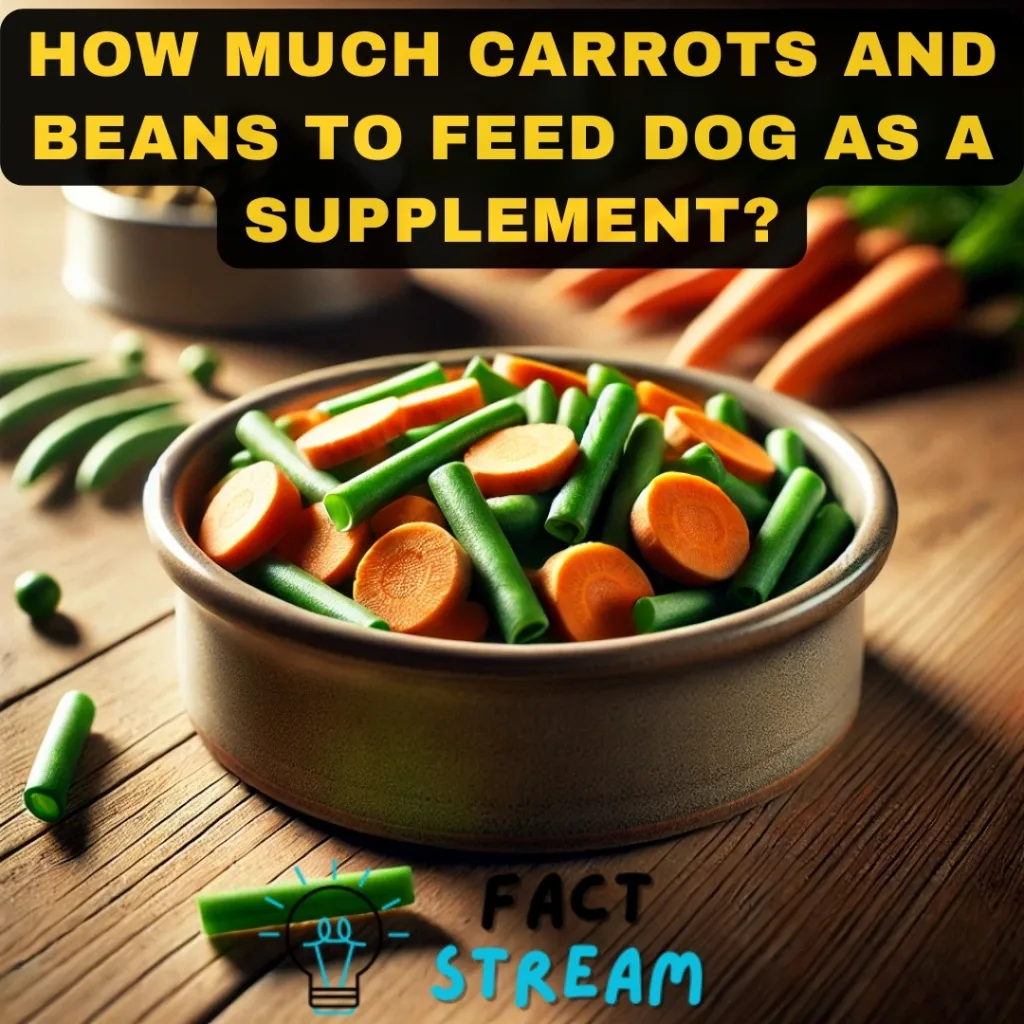How Much Carrots and Beans to Feed Dog as a Supplement?
It’s great that you’re exploring ways to add healthy and nutritious supplements to your dog’s diet! Carrots and beans can be excellent additions, providing essential vitamins, minerals, and fiber. However, it’s essential to determine the appropriate amount to feed your furry friend. Let’s break down the benefits and precautions for adding these vegetables to your dog’s meals.
Carrots: A Crunchy Delight
Carrots are a fantastic source of vitamins, minerals, and fiber, making them a great low-calorie treat for dogs. Here’s why carrots can be a good addition to your dog’s diet:
- Dental Health: Carrots can help clean your dog’s teeth and freshen their breath thanks to their crunchy texture.
- Low in Calories: With only about 25 calories per medium carrot, they’re an excellent option for pups needing to lose a little weight.
- Rich in Nutrients: Carrots are packed with beta-carotene, Vitamin A, Vitamin K, Vitamin B6, potassium, antioxidants, calcium, and iron.
- Vision Support: Beta-carotene, which is converted to vitamin A in the body, is vital for maintaining good eyesight.
- Immunity Boost: Vitamin A helps strengthen your dog’s immune system, keeping them healthy and strong.
Serving Carrots to Your Dog
Here are some ways to incorporate carrots into your dog’s diet:
- Raw: Cut raw carrots into bite-sized pieces to prevent choking hazards, especially for smaller dogs.
- Cooked: Steaming carrots enhances their flavor while preserving most of their nutrients.
- Frozen: Frozen carrots make a refreshing and soothing treat for teething puppies.
- Grated: Grate carrots over your dog’s regular food as a delicious and nutritious topper.
- Juice: Fresh carrot juice can be a healthy option, but remember to add some pulp back for fiber.
- Baked Treats: Carrots can be incorporated into homemade dog biscuits or crackers.
Beans: A Protein and Fiber Powerhouse
Beans are a good source of protein, fiber, and essential vitamins and minerals. Here are some benefits of including beans in your dog’s diet:
- Protein Source: Beans provide protein, which is essential for muscle maintenance and a strong immune system.
- Digestive Support: The fiber in beans aids in digestion and can help prevent constipation.
- Nutrient Rich: Beans offer various essential nutrients, including antioxidants, fiber, protein, folic acid, and silicon, which promote a healthy coat and skin.
Safe Beans for Dogs
- Green Beans: A popular choice, green beans are low in calories and can help with weight management.
- Chickpeas (Garbanzo Beans): Packed with antioxidants, fiber, and protein, chickpeas can support healthy digestion and muscle development.
- Kidney Beans: Cooked kidney beans are safe and nutritious, but avoid raw kidney beans as they contain a toxin called lectin.
- Black Beans: Rich in protein, fiber, antioxidants, and anti-inflammatory compounds, black beans can boost your dog’s immune system.
- Lima Beans (Butter Beans): These beans are an excellent source of protein, fiber, and vitamins, but always cook them thoroughly before serving.
- Pinto Beans: Pinto beans provide protein, fiber, and essential vitamins and minerals, but feed them in moderation as they can be high in purines.
- Edamame: Edamame can be an occasional treat, offering protein, vitamins, minerals, and fiber.
Beans to Avoid
- Refried Beans: High in fat and salt, making them unhealthy for dogs.
- Baked Beans: Often contain high amounts of salt, sugar, onions, and garlic, which can be harmful to dogs.
- Cocoa Beans: These are the main ingredient in chocolate, which is toxic to dogs.
- Coffee Beans: Contain high levels of caffeine, which can be harmful to dogs.
How Much to Feed
While the sources don’t specify exact amounts, it’s generally recommended that treats and supplements, including carrots and beans, should not exceed 10% of your dog’s daily caloric intake. It’s essential to start with small amounts and monitor your dog’s reaction to any new food.
Important Considerations:
- Consult Your Veterinarian: Before making any significant changes to your dog’s diet, always consult with your veterinarian. They can provide personalized advice based on your dog’s breed, size, age, activity level, and overall health.
- Introduce Gradually: When introducing new foods, do so gradually to avoid digestive upset. Start with a small amount and gradually increase the portion over several days.
- Cook Thoroughly: Always cook beans thoroughly before feeding them to your dog. Raw or undercooked beans can contain harmful substances.
- Avoid Seasonings: Do not add salt, spices, onions, garlic, or other seasonings to carrots or beans. These can be harmful to dogs.
- Choking Hazards: Cut carrots and beans into bite-sized pieces to prevent choking, especially for smaller dogs.
- Moderation is Key: Even healthy treats should be given in moderation. Too many carrots or beans can lead to digestive issues like gas, bloating, or diarrhea.
By following these guidelines and working with your veterinarian, you can safely incorporate carrots and beans into your dog’s diet as healthy and delicious supplements!


